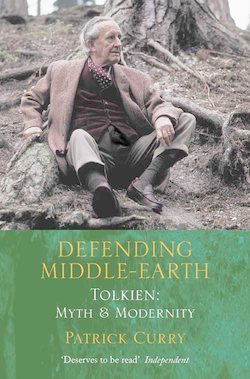Читать книгу Defending Middle-earth: Tolkien: Myth and Modernity - Patrick Curry - Страница 4
Preface
ОглавлениеLike The Lord of the Rings, if in no other way, this tale too grew in the telling. It began life as what was intended to be a short paper for the 1992 Centenary Conference in Oxford. But I found I couldn’t stop, and before long it had grown to nearly 30,000 words. Eventually, without really setting out to do so, I spent a good deal of the last five years researching and writing it. Part of the problem was that Tolkien’s work impinges on so many complex and profound concerns, each with its own centrifugal tendency, that trying to exert some editorial control has been (I imagine) like riding a wild horse.
For whom is the book intended? According to Tolkien, one face of fairy-stories is ‘the Mirror of scorn and pity towards Man.’ Scorn and pity is certainly what I feel for one section of humanity I encountered while working on it, namely all those editors, critics and authors who look down their nose at Tolkien, usually without ever having really read or thought about him. They exhibited disturbing signs of a group ‘mind’ based entirely on snobbery and prejudice. I would therefore be astounded, albeit pleasantly so, if my book persuades any of them otherwise; but in any case, it is not really meant for them. May it rather provide a way in for those who come to Tolkien’s books with an open mind, send former readers back to them again, and help those who already love them to appreciate them still more. (And if any of the latter have felt ashamed to admit it, may it help you understand why you need do so no longer!)
I may as well also mention that alongside this book another text has sprung up willy-nilly. Too long for an article, too short for a book – although still growing – it takes the via negativa of tackling Tolkien’s Marxist, modernist, feminist and psychoanalytic critics directly. This enables some things to be discussed that were not appropriate to include here. I am thinking of calling it something like, ‘The Discursive Dynamics of Tolkien’s Fantasy: A Post-Axiological Critique,’ and seeing what happens. (Academic editors: please confound my expectations, and form an orderly queue.)
As a result of my experience with the ‘experts’ to date, I am all the more grateful to Christopher Moore, of Floris Books, for his thorough, sensitive and patient editorial guidance; and to Suzanna Curry, for her support, wisdom and forbearance. They have made it a much better book than it would have otherwise been.
It is also a pleasure to thank these others who have helped. Michael Winship, Clay Ramsay, Jesper Siberg, Virginia Luling, Simon Schaffer, Elaine Jordan, John Seed and Angus Clarke read and commented on early drafts. Stratford Caldecott, Tony Linsell, Kathleen Herbert, Charles Coulombe, Raphael Samuel, Dwayne Thorpe, Ray Keenoy and my mother, Noreen Curry, provided valuable moral support and encouragement in discussions or correspondence. Tom Shippey, Ursula Le Guin and Brian Attebery also made encouraging noises early on in correspondence, which I greatly appreciated. Charles Noad kindly read the whole penultimate draft and saved me from many small and some not-so-small errors; so did Nicola Bown, who made some excellent suggestions. (None of these people, obviously, have any responsibility for what I have finally said.)
I would also like to thank Warwick and Linda of the Q.E.L. Cafe, in Notting Hill Gate, for their hospitality; and Skrét, Filip and Karel of the Brno Tolkien Society, whom I met in Oxford in 1992, for reminding me what it’s all about. (May you too be lucky enough to be reminded, when you have almost forgotten.)
I am also grateful to HarperCollins UK for permission to quote from the published works of J.R.R. Tolkien.
Finally, this book is dedicated to the memories of three people, very different but all with a place in my heart, who died while I was still writing it: my father, Peter D. Curry (1912–1996), the writer P. L. Travers (1899–1996), and the historian Raphael Samuel (1934–1996). R.I.P.
